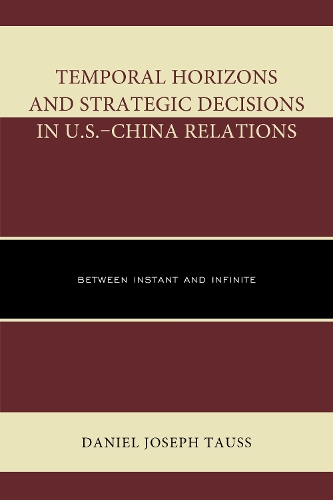
Temporal Horizons and Strategic Decisions in U.S.China Relations: Between Instant and Infinite
(Hardback)
Publishing Details
Temporal Horizons and Strategic Decisions in U.S.China Relations: Between Instant and Infinite
By (Author) Daniel Joseph Tauss
Bloomsbury Publishing PLC
Lexington Books
6th May 2015
United States
Classifications
Professional and Scholarly
Non Fiction
Central / national / federal government policies
Political economy
Social forecasting, future studies
327.73051
Physical Properties
Hardback
260
Width 161mm, Height 234mm, Spine 23mm
508g
Description
Using an interdisciplinary social-science approach, Temporal Horizons and Strategic Decisions in USChina Relations: Between Instant and Infinite takes on the challenge of understanding the foreign policy decision process through the lens of the temporal horizon. A temporal horizon is the distance into the future a decision-maker prioritizes when evaluating outcomes and considering possibilities. By looking at a number of recent key moments of USChina relations that have immediate, short-term, long term, and far-reaching implications, the book considers which are predominant in the policy process. Looking at the role of time as a factor in the decision-making process is not new to political science, but this book attempts to break down and articulate the process by looking at a range of specific time frames. The book places special attention on future considerations in a variety of ways, combining the insights of psychology, economics, and future studies to consider political science in a new manner.
Reviews
Though others have studied the importance of 'time horizon' in foreign policy making, Tauss appears to be a pioneer in introducing this concept to the study of US-China relations. The extent of a decision-makers time horizon can have a significant impact on policy outcomes. Depending on how far a decision-makers horizon extends, the temporal space ranges from instantaneous (split-second moment) to chiliastic (exceptionally long term). Many individuals are likely to use a variety of time horizons in their decision making. As Tauss confesses, 'Since the very concept of time horizon is often not predominant in the minds of the actors, its use in the decision-making process might have to be extracted through indirect analysis rather than direct observation.' To apply time horizon to US-China relations, he selected two cases: the 19951996 Taiwan Strait crisis and Chinas entry into the WTO, which he painstakingly studied. In the end, he deplores that there are 'difficulties in isolating the horizons from the other elements in how decisions are made, but the fact remains that horizons play a vital role' in decision making. . . .Summing Up: Recommended. Graduate, research, and professional collections. * CHOICE *
With this well written and fascinating book Tauss has taken on one of the more difficult and certainly understudied concepts in the study of international relations: time.It is difficult to overstate how important the concept of time is to international relations, and how detrimental its neglect has been. Usually the purview of formal modelers and rational choice theorists, Tauss has taken the concept into a new analytical realm through his discursive approach. To do so he identifies multiple temporal horizons that shape perceptions of policymakers and societies alike and then deploys this analytical framework in carefully researched case studies of relations between the United States and China. This is an outstanding book, and a must read for every scholar of foreign policy and international relations. -- Jarrod Hayes, Sam Nunn School of International Affairs, Georgia Institute of Technology
This study breaks new ground in introducing the concept of time horizons to explain previously puzzling aspects of the likely most important interstate pairing of the new millenniumthe U.S. and China. Tauss examines issues in military security, along with economics, to reveal how leadership variation in time horizons can account for observed behavior.The book is a must read for those interested in Chinese and U.S. foreign policy, along with anyone who seeks a deeper understanding of national decision-making. -- Patrick James, University of Southern California
Author Bio
Daniel Tauss is director of the Progressive Confucianism Project and was scholar-in-residence at the Center for Asian Democracy at the University of Louisville.
